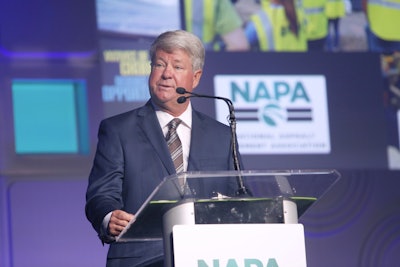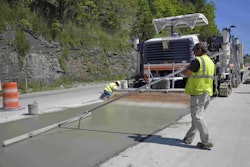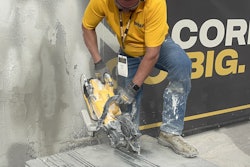 John Harper, 2019 NAPA chairman, was installed Monday.
John Harper, 2019 NAPA chairman, was installed Monday.John L. Harper was sworn in to serve as the 2019 chairman of the National Asphalt Pavement Association during its 64th annual meeting this week on Marco Island, Florida.
About 950 paving contractors and asphalt material producers looked on as outgoing chairman Craig W. Parker turned over the reins to Harper, senior vice president of Construction Partners Inc., a publicly traded firm that specializes in roadbuilding and maintenance in five southeastern states. Based in Dothan, Alabama, the company employs more than 100 workers and owns 30 hot mix asphalt (HMA) plants.
Harper is also vice president of a subsidiary, Wiregrass Construction Company, which his father, Henry Harper, began in 1965 in Dothan. Wiregrass Construction is now an asphalt pavement mix producer, aggregate and construction company that builds and supplies materials for roadways and complex asphalt infrastructure projects. It owns and operates 13 high-capacity asphalt plants and five aggregate mining operations.
Harper told members that his 2019 platform prioritizes the great need for workforce development.
Workforce development and labor shortages, he says, are affecting the entire construction industry, and NAPA is working on establishing a permanent standing committee to help with this.
“Like other construction sectors, the asphalt pavement industry offers many rich and rewarding careers. Our challenge is to make young people aware of the good lives they can build for themselves by building America’s infrastructure,” says Harper. “NAPA is launching an ambitious effort to raise awareness of the opportunities asphalt offers, and we are committed to addressing today’s workforce challenges while also positioning the industry for the future.”
Harper has been an active member of NAPA, serving as the state director for Alabama for five years. He’s chaired the Asphalt Pavement Alliance Deployment Committee and serving on task groups focused on introducing warm-mix asphalt to the United States and increasing the use of reclaimed asphalt pavement.
Collaborating with schools
The association is collaborating with high schools to help recruit and train future workers for the roadbuilding and pavement industry, among other efforts, he says. The industry can also help train more workers by collaborating with colleges that specialize in reentry programs for incarcerated adults, Harper notes.
The association wants students, as they their explore career paths, to know there’s a viable option in the industry to the traditional four-year college degree, he says.
To that end, NAPA’s state chapter in Indiana took a new tack last October by forming a partnership with Future Farmers of America, in which more than 2,200 students stopped by a booth to check out possible future jobs in asphalt. “It’s something we believe our industry can build on,” Harper says of that effort..
Last month, Napa staff representatives from the members of the executive committee participated in a strategic planning summit in which they focused on the crafting of a framework for addressing the long-term workforce needs of the industry, according to Harper.
The group identified three areas of focus for the workforce development strategy.
They advocate creating and communicating a compelling story on the positive benefits and opportunities for career growth and advancement in the asphalt industry. They talked about building a comprehensive and collaborative network or partnership with stakeholders inside and outside of the industry to recruit, retain, and develop the new asphalt workforce. And thirdly, they worked on a plan to assist member organizations in exceptional environment and provide opportunities for their workers.
NAPA added workforce issues as a focus area for addressing in their summit, which is a first step in determining how the association and industry can best address workforce challenges and launch a campaign to reach out.
“This will be a robust effort that we’ll start with research needs, evaluating what is currently working in determining the best way to reach young people and the parents and teachers and guidance counselors who influence their career choices,” Harper says.
He discussed competition and what NAPA is about it, including a marketing program that is responsible for developing writing materials for the asphalt pavement industry along with marketing and educational materials to help communicate research findings. These branding materials include advertisements in national trade magazines as well as infographics, social media and more.
“We’d love to have more contractors using these materials, top, as we believe they are important efforts that helped the industry build cooperative partnerships and promote asphalt’s performance benefits,” Harper says.
“We’re now working on the next generation of branding for the industry which Napa is calling ‘Performance for a Lifetime.’
Big issues require a national response
Also affecting the industry, Harper says, is competition from other pavement materials, the perennial fight for more federal funding, disruption in the form of new technologies and materials, environmental and health and safety regulations and work zone safety.
Harper says he’ll work with NAPA’s professional staff on the need for infrastructure investment and a stable funding stream for construction, maintenance, and improvement of the nation’s infrastructure.
These types of issues are too big to be addressed by an individual company or on a state-by-state level, Harper says. This work is best done on a national level and in coordination, and members who are active in meetings and committees can best prepare their companies for the challenges and opportunities that lie ahead, according to Harper.
NAPA is an invaluable resource that assists the industry “with the everyday challenges we all face and help us protect and grow our market share,” according to Harper.
“Napa is looking at what the industry needs on a national level. To achieve this, the association has an in-depth strategic plan, focused on meeting today’s challenges head on while anticipating future needs and charting a course that best serves our members.
“We also regularly reviewed and reassess how NAPA works to achieve these goals,” he adds.
Kudos for others’ contributions
Harper, who in 2018 served as NAPA’s vice chairman, lauded the outgoing chairman, Parker, for his leadership. He describes Parker’s contributions as enhancing the association’s safety programs and developing a public awareness campaign aimed at protecting workers in work zones. “Safety will always be our top core value,” Harper told the crowd.
He also paid kudos to retiring NAPA President Mike Acott, who was inducted into the Asphalt Pavement Hall of Fame in 2014 for decades of service to the industry, and has continued contributing to the association and industey since then.
“I know one of the main reasons for this amazing turnout is to pay tribute to our outgoing president, Mike Acott, for his 35 years of outstanding service to NAPA and our industry,” Harper said, looking out over the audience toward Acott.
“Mike, without your leadership, our industry would not be where it is today,” Harper told him. “And Denise Acott, Mike’s wife, has been an unwavering source of support for Mike in our industry, and she, too, will be missed.”
Harper noted that the association’s new president and CEO, Audrey Copeland, “has a proven track record with NAPA.”
She joined NAPA as the VP for Engineering, Research and Technology in 2012 and has expanded the NAPA engineering team and served as the technical lead for more than $2 million in Pavement Economics Committee research projects.
Copeland began in the industry as a highway engineer with FHWA. She holds a PhD in Civil Engineering from Vanderbilt University and master’s and bachelor of science degrees in civil and environmental engineering from Tennessee Technological University.
Harper also thanked NAPA’s other officers and their spouses.
He’s a 1987 graduate of Auburn University, home to NCAT – the National Center for Asphalt Technology, which was established in 1986 as a partnership between Auburn University and the National Asphalt Paving Association Research and Education Foundation. He and Acott serve on the NCAT board of directors.









